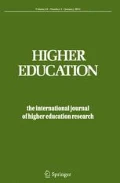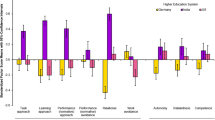Abstract
Junior academics at German universities work and qualify in a highly competitive environment. Most of them have to cope with too little time for too many demands in research and teaching. As previous studies have shown, these work conditions may impair well-being due to goal conflicts and may threaten their teaching motivation. How could this be prevented? Drawing on self-determination theory, the present study takes a motivational psychological perspective and addresses the role of the satisfaction of basic needs for autonomy, competence, and relatedness for the experience of goal conflicts and self-determined teaching motivation. Results from Latent Profile Analysis and multivariate analyses show that satisfaction of all three needs is necessary for junior academics to feel less strained by goal conflicts. Autonomy plays a crucial role for the frequency of goal conflicts, whereas competence has a particular impact on teaching motivation. The role of relatedness remains difficult to determine. Results are discussed in terms of work conditions, individual competencies, and derivable practical implications.
Similar content being viewed by others
Notes
The four-class solution was selected on the basis of AIC, BIC, aBIC, and Vuong–Lo–Mendell–Rubin test, as well as the Lo–Mendell–Rubin adjusted LRT. Those tests suggest a good fit, and that four classes are sufficient but that five classes are not needed. However, we have to admit that the entropy was 0.663 and the bootstrapped parametric likelihood ratio test has a p value of 0.0060, which suggests that five classes are better than four classes. Finally, as the four-class model fits our theoretical expectations best, we have chosen to go with the four-class model (Bold values in Table 4).
References
Austin, J. T., & Vancouver, J. B. (1996). Goal constructs in psychology: Structure, process, and content. Psychological Bulletin, 120(3), 338.
Becker, F. G., Tadsen, W. N., Stegmüller, R., & Wild, E. (2011). Motivation und Anreize zu, guter Lehre’ im Rahmen des Inplacement (MogLI): Konzeption. Durchführung: Auswertung und Diskussion der Interviews mit den Hochschulleitungen.
BMBF. (2013). Bundesbericht für den Wissenschaftlichen Nachwuchs 2013—Statistische Daten und Forschungsbefunde zu Promovierenden und Promovierten in Deutschland. Bielefeld: W. Bertelsmann Verlag.
Boudreaux, M. J., & Ozer, D. J. (2013). Goal conflict, goal striving, and psychological well-being. Motivation and Emotion, 37(3), 433–443. doi:10.1007/s11031-012-9333-2.
Brunstein, J. C., & Maier, G. W. (1996). Persönliche Ziele: Überblick zum Stand der Forschung. Psychologische Rundschau, 47, 146–160.
Deci, E. L., & Ryan, R. M. (2000). The ‘what’ and ‘why’ of goal pursuits: Human needs and the self-determination of behavior. Psychological Inquiry, 11, 227–268.
Deci, E. L., Ryan, R. M., Gagné, M., Leone, D. R., Usunov, J., & Kornazheva, B. P. (2001). Need satisfaction, motivation, and well-being in the work organizations of a former eastern bloc country: A cross-cultural study of self-determination. Personality and Social Psychology Bulletin, 27(8), 930–942.
Enders, J., & Teichler, U. (1996). The academic profession in Germany. In P. G. Altbach (Ed.), The international academic profession—Portraits of fourteen countries (pp. 439–492). Princeton, NJ: The Carnegie Foundation for the Advancement of Teaching.
Esdar, W., & Gorges, J. (2012). Ist Bologna angekommen? Nachwuchswissenschaftler/innen und die Umsetzung der Studienreform an deutschen Universitäten. In F. G. Becker, G. Krücken, & E. Wild (Eds.), Lehre in der Hochschule—Wirkungen von Anreizen, Kontextbedingungen und Reformen (pp. 99–114). Bielefeld: W. Bertelsmann Verlag.
Esdar, W., Gorges, J., & Wild, E. (2012). Karriere, Konkurrenz und Kompetenzen—Arbeitszeit und multiple Ziele des wissenschaftlichen Nachwuchses. Die Hochschule, 2, 273–290.
Esdar, W., Gorges, J., & Wild, E. (2013). Synergieeffekte und Ressourcenkonflikte von Forschung & Lehre auf dem Weg zur Professur. Zeitschrift für Hochschulentwicklung, 3, 29–41.
Fernet, C., Austin, S., Trépanier, S. G., & Dussault, M. (2013). How do job characteristics contribute to burnout? Exploring the distinct mediating roles of perceived autonomy, competence, and relatedness. European Journal of Work and Organizational Psychology, 22(2), 123–137.
Geiser, C. (2010). Datenanalyse mit Mplus. Wiesbaden: VS Verlag für Sozialwissenschaften.
Hanfstingl, B., Andreitz, I., Müller, F. H., & Thomas, A. (2010). Are self-regulation and self-control mediators between psychological basic needs and intrinsic teacher motivation? Journal for Educational Research Online/Journal für Bildungsforschung Online, 2(2), 55–71.
Heckhausen, J. E., & Heckhausen, H. E. (2008). Motivation and action. Cambridge: Cambridge University Press.
Höhle, E. A., & Teichler, U. (2013). The teaching function of the academic profession. In E. A. Höhle & U. Teichler (Eds.), The work situation of the academic profession in Europe: Findings of a survey in twelve countries (pp. 79–108). Dordrecht: Springer.
HRK [Hochschulrektorenkonferenz] (2006). Bologna-Reader Texte und Hilfestellungen zur Umsetzung der Ziele der Bologna-Prozesses an deutschen Hochschulen. Service-Stelle Bologna, Beiträge zur Hochschulpolitik 8/2004,5. Auflage, Oktober 2007, Bonn, GER.
Kızıltepe, Z. (2008). Motivation and demotivation of university teachers. Teachers and Teaching: Theory and practice, 14(5–6), 515–530.
Klinger, E. (1987). The interview questionnaire technique: Reliability and validity of a mixed idiographic-nomothetic measure of motivation. In J. N. Butcher & C. D. Spielberger (Eds.), Advances in personality assessment (Vol. 6). London: Lawrence Erlbaum Associates.
Kloke, K., & Krücken, G. (2012). “Der Ball muss dezentral gefangen werden.”: Organisationssoziologische Überlegungen zu den Möglichkeiten und Grenzen hochschulinterner Steuerungsprozesse am Beispiel der Qualitätssicherung in der Lehre. In U. Wilkesmann & C. J. Schmid (Eds.), Hochschule als Organisation (pp. 311–324). Wiesbaden: VS Verlag für Sozialwissenschaften.
Krücken, G., Blümel, A., & Kloke, K. (2013). The managerial turn in higher education? On the interplay of organizational and occupational change in German academia. Minerva, 51(4), 417–442.
Leisyte, L., Enders, J., & De Boer, H. (2009). The balance between teaching and research in Dutch and English universities in the context of university governance reforms. Higher Education, 58(5), 619–635. doi:10.1007/s10734-009-9213-1.
Locke, E. A., Smith, K. G., Erez, M., Chah, D. O., & Schaffer, A. (1994). The effects of intra-individual goal conflict on performance. Journal of Management, 20(1), 67–91. doi:10.1177/014920639402000104.
Menges, R., & Austin, A. E. (2001). Teaching in higher education. In V. Richardson (Ed.), Handbook of research on teaching (Vol. 4, pp. 1122–1156). Washington, D.C.: American Educational Research Association.
Osterloh, Margit, & Bruno S. Frey (2008). Anreize im Wissenschaftssystem. Working Paper, Institute for Empirical Research in Economics, University of Zurich.
Pastor, D. A., Barron, K. E., Miller, B. J., & Davis, S. L. (2007). A latent profile analysis of college students’ achievement goal orientation. Contemporary Educational Psychology, 32(1), 8–47.
Pelletier, L. G., Séguin-Lévesque, C., & Legault, L. (2002). Pressure from above and pressure from below as determinants of teachers’ motivation and teaching behaviors. Journal of Educational Psychology, 94(1), 186–196.
Riediger, M., & Freund, A. M. (2004). Interference and facilitation among personal goals: Differential associations with subjective well-being and persistent goal pursuit. Personality and Social Psychology Bulletin, 30(12), 1511–1523.
Roth, G. (2014). Antecendents and outcomes of teachers’ autonomous motivation. In P. Richardson, S. A. Karabenik, & H. M. G. Watt (Eds.), Teacher Motivation: Theory and Practice (pp. 36–51). Routledge: New York.
Roth, G., Assor, A., Kanat-Maymon, Y., & Kaplan, H. (2007). Autonomous motivation for teaching: How self-determined teaching may lead to self-determined learning. Journal of Educational Psychology, 99(4), 761–774.
Ryan, R. M., & Connell, J. P. (1989). Perceived locus of causality and internalization: Examining reasons for acting in two domains. Journal of Personality and Social Psychology, 57, 749–761.
Slocum, J. W., Cron, W. L., & Brown, S. P. (2002). The effect of goal conflict on performance. Journal of Leadership & Organizational Studies, 9(1), 77–89. doi:10.1177/107179190200900106.
Stegmüller, R. (2012). Determinanten der Lehrmotivation von Hochschulprofessoren. Bielefeld: Universität Bielefeld.
Stegmüller, R., Tadsen, W. N., Wild, E., & Becker, F. G. (2012). Die Lehrmotivation von Professorinnen und Professoren–Befunde zu ihrer Ausprägung und ihren Bedingungen. In F. G. Becker, G. Krücken, & E. Wild (Eds.), Lehre in der Hochschule—Wirkungen von Anreizen, Kontextbedingungen und Reformen (pp. 137–158). Bielefeld: W. Bertelsmann Verlag.
Trépanier, S. G., Fernet, C., & Austin, S. (2013). The moderating role of autonomous motivation in the job demands-strain relation: A two sample study. Motivation and Emotion, 37(1), 93–105.
van den Broeck, A., Vansteenkiste, M., De Witte, H., & Lens, W. (2008). Explaining the relationships between job characteristics, burnout, and engagement: The role of basic psychological need satisfaction. Work & Stress, 22(3), 277–294. doi:10.1080/02678370802393672.
Vansteenkiste, M., Neyrinck, B., Niemiec, C. P., Soenens, B., Witte, H., & Broeck, A. (2007). On the relations among work value orientations, psychological need satisfaction and job outcomes: A self-determination theory approach. Journal of Occupational and Organizational Psychology, 80(2), 251–277.
Visser-Wijnveen, G. J., Stes, A., & Van Petegem, P. (2012). Development and validation of a questionnaire measuring teachers’ motivations for teaching in higher education. Higher Education, 64(3), 421–436. doi:10.1007/s10734-011-9502-3.
Watt, H. M., & Richardson, P. W. (2008). Motivation for teaching. Learning and Instruction, 18(5), 405–407.
Wilkesmann, U., & Schmid, C. J. (2012). The impacts of new governance on teaching at German universities. Findings from a national survey. Higher Education, 63(1), 33–52. doi:10.1007/s10734-011-9423-1.
Wissenschaftsrat (2011). Neuere Entwicklungen der Hochschulfinanzierung in Deutschland. http://www.wissenschaftsrat.de/download/archiv/VS_Bericht_Juli_2011.pdf.
Acknowledgments
This research was funded by the German Federal Ministry of Education and Research (BMBF), support code: 01PH08032. We thank all university executives for their support and junior academics for their participation.
Author information
Authors and Affiliations
Corresponding author
Rights and permissions
About this article
Cite this article
Esdar, W., Gorges, J. & Wild, E. The role of basic need satisfaction for junior academics’ goal conflicts and teaching motivation. High Educ 72, 175–190 (2016). https://doi.org/10.1007/s10734-015-9944-0
Published:
Issue Date:
DOI: https://doi.org/10.1007/s10734-015-9944-0



